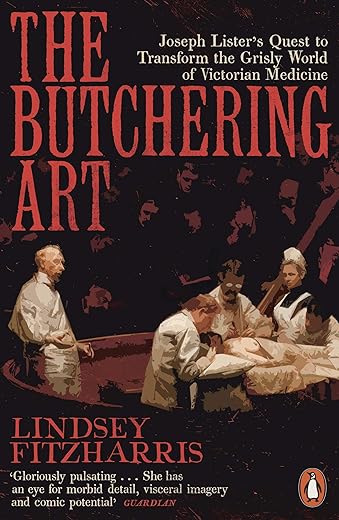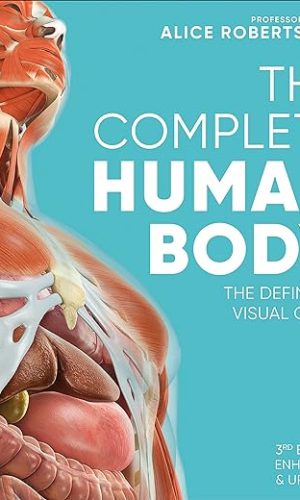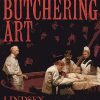The Butchering Art: Joseph Lister’s Quest to Transform the Grisly World of Victorian Medicine
£9.40£10.40 (-10%)
DAILY MAIL, GUARDIAN AND OBSERVER BOOKS OF THE YEAR 2017
Winner of the 2018 PEN/E.O. Wilson Prize for Literary Science Writing
Shortlisted for the 2018 Wellcome Book Prize
Shortlisted for the 2018 Wolfson Prize
The story of a visionary British surgeon whose quest to unite science and medicine delivered us into the modern world – the safest time to be alive in human history
In The Butchering Art, historian Lindsey Fitzharris recreates a critical turning point in the history of medicine, when Joseph Lister transformed surgery from a brutal, harrowing practice to the safe, vaunted profession we know today.
Victorian operating theatres were known as ‘gateways of death’, Fitzharris reminds us, since half of those who underwent surgery didn’t survive the experience. This was an era when a broken leg could lead to amputation, when surgeons often lacked university degrees, and were still known to ransack cemeteries to find cadavers. While the discovery of anaesthesia somewhat lessened the misery for patients, ironically it led to more deaths, as surgeons took greater risks. In squalid, overcrowded hospitals, doctors remained baffled by the persistent infections that kept mortality rates stubbornly high.
At a time when surgery couldn’t have been more dangerous, an unlikely figure stepped forward: Joseph Lister, a young, melancholy Quaker surgeon. By making the audacious claim that germs were the source of all infection – and could be treated with antiseptics – he changed the history of medicine forever.
With a novelist’s eye for detail, Fitzharris brilliantly conjures up the grisly world of Victorian surgery, revealing how one of Britain’s greatest medical minds finally brought centuries of savagery, sawing and gangrene to an end.
Read more
Additional information
| Publisher | Penguin (4 Oct. 2018) |
|---|---|
| Language | English |
| Paperback | 304 pages |
| ISBN-10 | 0141983388 |
| ISBN-13 | 978-0141983387 |
| Dimensions | 12.9 x 1.7 x 19.8 cm |










by Mark
What an absolutely absorbing and informative account of Victorian surgery this is.
Joseph Lister was a toweringly important figure in the transformation of medical treatment from, quite literally, the butchering of the unfortunate public into something more closely resembling modern medicine, and richly deserves this comprehensively researched and well written account of his life and times.
Coming to this book soon after watching the BBC sitcom Quacks, I was actually taken aback at the parallels between comedic fiction and real life.
Building on Pasteur’s insights, Lister struggled to convince the medical establishment of the truth of germ theory – without which his antiseptic surgical techniques would have been pretty meaningless. But he proselytised his theories and demonstrated his techniques endlessly down the years, until eventually a new generation of surgeons schooled in his approach became the new establishment.
Lindsey Fitzharris tells an often gory story with verve and enthusiasm. I read this book through in a single day, and enjoyed every minute of it.
by Anne
In the first decade of the last century my grandmother, then a young medical student in London, heard Lord Lister lecture about the benefits of antisepsis in medical practice. Seventy years earlier her grandfather had been the first doctor to successfully treat a young agricultural worker with a compound fractured femur by setting the leg in traction in a trough filled with plaster of Paris. The young man made a full recovery, but he was lucky. If he had been admitted to hospital his chances of survival would have been very poor.
Lindsey Fitzharris’s new biography of Joseph Lister makes it all too clear how a failure to understand the causes of infection, combined with (to us) utterly horrifying disregard of even basic hygiene, led to death from sepsis, gangrene and other infections that we would now recognise arose from bacterial infection. And not only patients died, doctors who handled infected patients or who cut themselves during surgery (which had to be performed at lightning speed before anaesthetics became available) also died of infection. Ironically the advent of anaesthesia actually increased mortality because more operations could be performed.
Lister’s Quaker background and his father’s improvements to the microscope combined with Lister’s own talents as a surgeon resulted eventually in success after many years of struggling to improve patient survival rates and eliminate deaths from infection. But Lister had not only to develop methods of keeping wounds clean and free from infection, and a theory of why the techniques worked, he had also to fight a medical profession whose models of the causes of disease rejected any notion that ‘germs’ might have a part to play.
By the time my grandmother heard Lister lecture he was a grand old man of the profession, but that position was hard won. Without his persistence and meticulous scientific approach modern surgery would be impossible, deaths from even minor injuries common and childbirth frequently fatal. In a world threatened with the loss of antibiotics we do well to remember how critical his discoveries were. Lindsey Fitzharris has written a thoroughly researched and highly readable account of how Lister changed the world. What a pity there are no illustrations, nevertheless it makes a gripping read.
by Pauline Butcher Bird
The title: The Butchering Art, is misleading because it’s a biography of Joseph Lister’s life and not a history of surgery, as I thought. Never mind, it is gruesome enough with details of mistakes like a penis chopped off alongside a leg because, before ether, the patient was awake and speed was crucial. Lister observed the first operation when ether was used and surgeons could finally take more time with their knives and saws. But still most everyone died from infection because surgeons’ hands, instruments and operating rooms were not cleaned between patients. They thought disease was created spontaneously and could not be stopped. Guided by Pasteur’s findings that infection consisted of microbes and could be transmitted through the air and by contact, Lister spent years searching for an antidote to stop their spread. He found carbolic acid and against great opposition from the medical world everywhere, he persisted with its use and his patients stopped dying. Slowly his fame spread and he was honoured as a giant in the history of medicine. Listerine was developed in his name by an American, Dr Joseph Joshua. I was disappointed not to learn more about his childless marriage or whether he upheld his Quaker beliefs.
Freak Out!: My Life With Frank Zappa